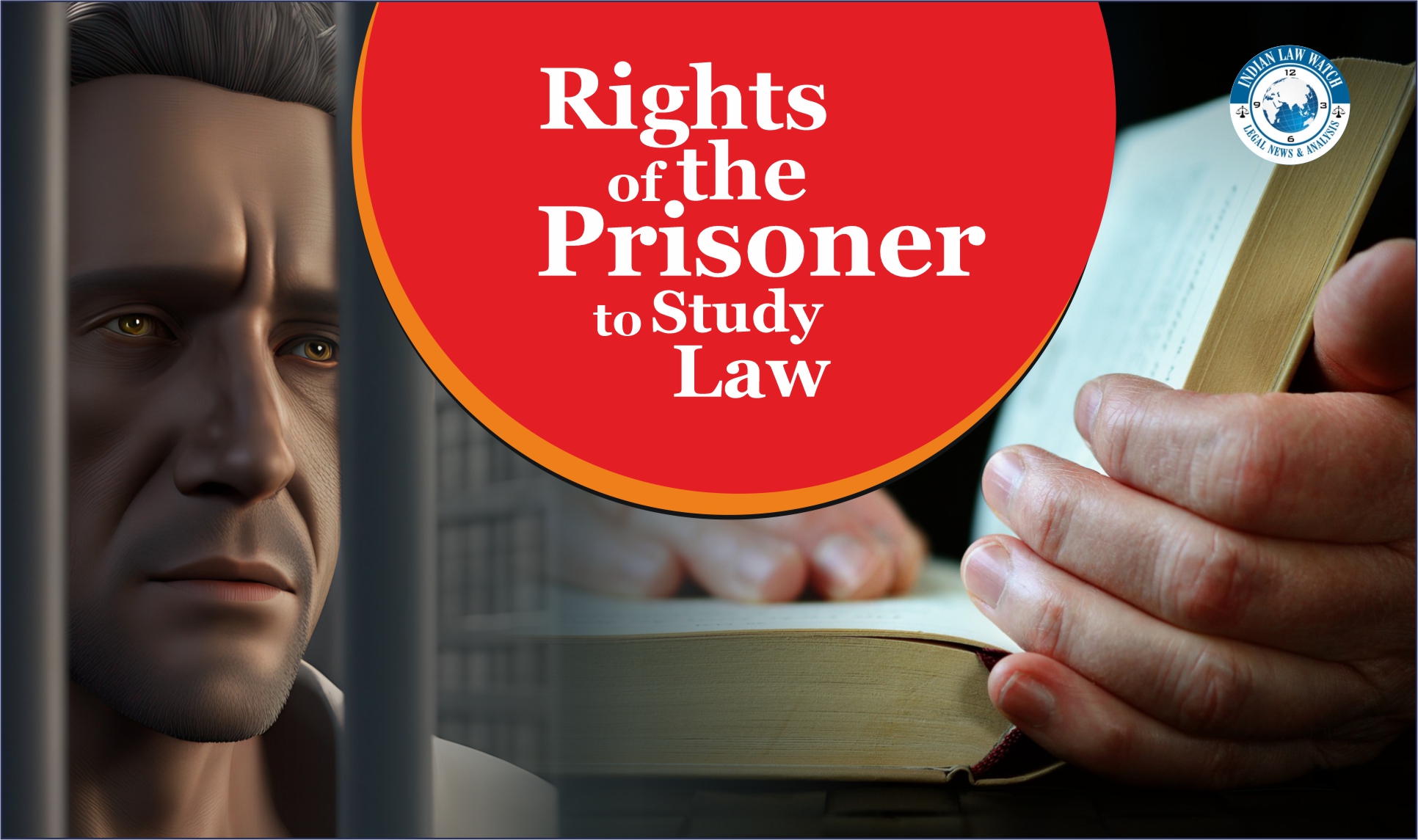

The Punjab and Haryana High Court at Chandigarh, in the case titled Prabal Titus Vs State of Punjab and others (CRM-M-30225-2024, cited in 2024 Live Law (PH) 221 and Neutral Citation No: =2024: PHHC:080312), delivered a judgment on June 19, 2024, allowing an accused imprisoned in a murder case to appear for his LLM exam. The court emphasized the paramount importance of prisoners’ legal rights, stating that preventing the accused from taking the exam would cause “irreparable loss” to his education and future. The Single Judge Bench, led by Hon’ble Mr. Justice Vikas Bahl, noted the prisoner’s academic excellence, including good grades in LLB and completion of 25 courses from various foreign universities, and decided that barring him from the exam would jeopardize his future. The jail authorities could not permit the petitioner to leave jail for exams without a court order, leading to this petition. The petition emphasizes the right to education as part of the right to life, citing precedents from the Andhra Pradesh and Delhi High Courts. The jail authorities could not permit the petitioner to leave jail for exams without a court order, leading to this petition. The petition emphasizes the right to education as part of the right to life, citing precedents from the Andhra Pradesh and Delhi High Courts.
Thus, the petition was allowed to support his pursuit of education.
Important Questions that Judgment raises for Future
The particular case raises an important question of law under:
- Does imprisonment restrict an individual’s right to pursue further education, and under what circumstances can a court permit a prisoner to continue their studies?
This question focuses on the balance between the penal system’s restrictions and the individual’s right to education, as highlighted in the High Court’s decision to allow an accused in a murder case to appear for his LLM exams despite being imprisoned.
- How does the legal system accommodate and support the educational aspirations of prisoners, and what does this reflect about the accessibility and inclusiveness of legal education in India?
The Bar Council of India (BCI) does not explicitly prohibit prisoners from becoming lawyers; however, there are certain stipulations and ethical considerations that can affect an individual’s eligibility to practice law. While the BCI does not have a blanket ban on prisoners becoming lawyers, each case is evaluated on its own merits. The individual’s rehabilitation, the nature of the offense, and compliance with the BCI’s ethical standards will all be crucial factors in determining eligibility to practice law.

Facts of this case
The petitioner filed a petition under Section 482 Cr.P.C. seeking directions for the authorities to arrange transportation for the petitioner, who is in custody related to FIR registered under Sections 302 and 120-B IPC at Police Station I.T. City, Mohali, from District Jail Rupnagar to Amity University. This is to enable the petitioner to take the “Master of Laws LL.M. (Corporate Laws) Final 2nd Semester Examination” at Amity University, Mohali. Additionally, the petitioner seeks to set aside the order passed by the Judicial Magistrate, which denied permission for the petitioner’s transportation to undertake the examination.The petitioner, who is in custody for an FIR registered under Sections 302 and 120-B IPC, claims false implication, and voluntarily submitted to the police. He has been in judicial custody and is currently in Rupnagar Jail. The petitioner, a meritorious student with an LLB degree and numerous foreign university courses, had his request to attend exams denied by the Judicial Magistrate 1st Class, who cited the lack of an admit card from the university. However, the university clarified that no admit card was required, and the student’s ID card suffices.
Precedents regarding Educational Rights of the Prisoner
The Division Bench of the Andhra Pradesh High Court in the case of Mullipudi Mukunda Rao. This judgment referenced the Hon’ble Supreme Court’s ruling in D.K. Basu Vs. State of W.B. (AIR 1997 Supreme Court 610), which underscored the requirements for arrest and detention under Article 21 of the Constitution, emphasizing the safety, health, and fundamental rights of detained or arrested persons. The Andhra Pradesh High Court observed that individuals in custody who need to appear for exams or job interviews should be facilitated by the police to do so, as the right to pursue education is a fundamental right. Failure to provide such facilitation could result in irreparable loss to the detainee.
In the case of D.K. Basu Vs. State of W.B. (AIR 1997 Supreme Court 610), the Supreme Court extensively considered the rights of citizens in custody, addressing custodial violence and the protection of fundamental and human rights. The Court emphasized the duties of the police under Article 21 of the Constitution, laying out 11 requirements to be followed in all cases of arrest and detention until legal provisions are made. These requirements ensure the safety, health, and fundamental rights of detained individuals.
The Supreme Court recognized that detainees might need to appear for exams or job interviews and emphasized that denying such opportunities could cause irreparable loss. The Court ruled that the right to pursue education is a fundamental right and directed the police to make arrangements for detainees to attend exams or interviews. These directives also apply to Magistrates if the detainees are in judicial custody, ensuring detainees’ access to education and job opportunities while in custody.
The Bench acknowledges in paragraph 8 that in a similar vein, the Delhi High Court’s judgment in Benzi Takhellambam’s case also allowed a petitioner in custody to take exams.
Furthermore, in paragraph 9, the Bench asserts that the judgments referred to fully support the petitioner’s case. The petitioner, a meritorious student, completed an LLB from Chandigarh University in 2023 with a CGPA of 8.01 out of 10 and has pursued 25 courses from foreign universities. The petitioner voluntarily surrendered to the police on the evening of May 10, 2024, as evidenced by Annexure P-2. Despite the petitioner’s application to the Judicial Magistrate 1st Class, SAS Nagar, dated June 13, 2024 (Annexure P-9), seeking relief, it was rejected on the grounds of not producing an Admit Card.
Given these circumstances, the Court concludes that denying the petitioner the opportunity to take the exams would cause irreparable harm, jeopardizing the completion of the LLM (Corporate Laws) and future prospects.
Consequently, the petition is allowed, and the order dated June 14, 2024, is set aside. The Court issues specific directions: the petitioner must deposit Rs. 75,000 by June 20, 2024, adequate police personnel must escort the petitioner from District Jail Rupnagar to Amity University, Sector 82-A, SAS Nagar, Mohali for exams starting at 10:15 AM, and ensure continuous vigilance during the exams to prevent any escape.
International Scenario
There have been notable cases where formerly incarcerated individuals have successfully become lawyers. For instance, Shon Hopwood, who served time in federal prison for bank robbery, became a lawyer and is now a professor at Georgetown University Law Center.
State Variations in US:
-
- Some states have specific rules regarding individuals with felony convictions. For example, some states may have automatic disqualifications for certain serious offenses, while others may be more lenient.
- In states like California and New York, individuals with criminal records have been admitted to the bar after demonstrating rehabilitation and fulfilling all other requirements.
United Kingdom
In the UK, while individuals with criminal records can study law and pursue legal careers, they must undergo rigorous assessments to determine their character and suitability to practice. Rehabilitation and honesty are crucial, and each case is evaluated on its merits by the relevant regulatory bodies, the SRA for solicitors, and the BSB for barristers. Individuals with criminal records can study law at universities. Admission to law schools typically does not disqualify applicants based on criminal records alone.
Singapore
Overall, Singapore’s approach to legal education for individuals in custody emphasizes rehabilitation, access to educational opportunities, and compliance with legal and ethical standards necessary for practicing law in Singapore.Top of FormBottom of Form

In conclusion, the judgment by the Punjab and Haryana High Court in Prabal Titus Vs State of Punjab exemplifies a significant stance on prisoners’ rights to pursue education. The court, recognizing the fundamental right to education as part of the right to life under Article 21 of the Constitution, allowed an accused in a murder case to attend his LLM exams despite being in judicial custody. Emphasizing the irreparable loss that would result from denying educational opportunities, the court underscored the importance of balancing penal restrictions with fundamental rights. This case raises critical questions about the limitations imposed on educational pursuits during imprisonment and the circumstances under which courts should intervene to uphold these rights. The judiciary’s role in ensuring access to education for prisoners sets a precedent for inclusive legal education practices in India, reflecting broader implications for the intersection of penal systems and fundamental rights in the pursuit of justice and rehabilitation.





